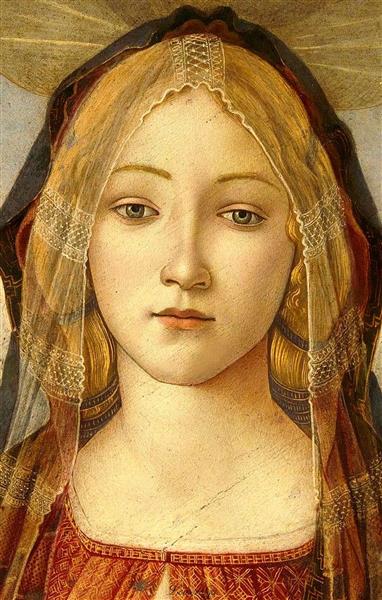Descrizione
Il dipinto "La Vergine e il bambino con San Giovanni e un angelo", attribuito a Sandro Botticelli, è un'opera che cattura l'essenza della spiritualità e della delicatezza del Rinascimento italiano. Realizzato nel 1460, questa immagine sottolinea l'approccio di Botticelli nella rappresentazione della bellezza femminile e la chiarezza della forma, le caratteristiche che definivano il loro stile, nonché la sua padronanza nell'uso del colore.
Il protagonista della composizione è, ovviamente, la Vergine Maria, che sostiene il bambino Gesù con una grazia materna che irradia tenerezza e pace. La figura della Vergine è al centro dell'opera, incorniciata da un sottile background paesaggio che fornisce un'atmosfera serena ed eterea. La sua espressione riflette sia la riverenza che l'amore, essendo un simbolo della maternità divina, che lo collega all'ideale della purezza e della devozione che ha predominato nell'iconografia religiosa del tempo.
Accanto a lui ci sono San Juan Bautista e un angelo, figure che hanno anche un profondo significato nel contesto religioso. San Juan, bambino in questa rappresentazione, è presentato come il precursore del bambino Gesù, con le sue delicate caratteristiche che emulano la genio del suo ruolo nella storia sacra. L'angelo, sebbene meno importante, funge da legame tra il mondo terreno e il celeste, fungendo da osservatore compassionevole e simbolico della presenza divina.
La composizione è notevolmente bilanciata, con una disposizione che guida lo sguardo dello spettatore verso il gruppo centrale. Botticelli usa uno schema triangolare, in cui la Vergine e il bambino formano la base, mentre San Giovanni e l'angelo creano un senso di elevazione e trascendenza. Questo tipo di organizzazione è una risorsa classica nella pittura rinascimentale, che fornisce un senso di ordine e armonia.
L'uso del colore in questo lavoro è rilevante, poiché Botticelli usa una tavolozza morbida e contemplativa, prevalentemente i toni blu e dorati che evocano una sensazione di calma e spiritualità. Questi colori sono emblematici nel loro lavoro, che simboleggiano sia la nobiltà della Vergine che la Luce divina che emana dal bambino Gesù. La consistenza dei tessuti, progettata con padronanza, serve non solo per decorare le figure, ma anche per inquadrare le emozioni che trasmettono.
Lo sfondo, che presenta un paesaggio di colline morbide e un cielo diafano, rafforza la connessione tra il terreno e il celeste. Questo riempimento consente alle figure di distinguersi come elementi centralizzati di un mondo che sembra sia fisico che spirituale. Botticelli raggiunge così un equilibrio visivo e interpretativo, in cui ogni elemento contribuisce alla narrazione del lavoro.
Attraverso il suo infondibile stile e attenzione alla bellezza idealizzata, Botticelli è posizionato come uno dei grandi maestri Rinascimento. "La Vergine e il bambino con San Giovanni e un angelo" non è solo una testimonianza della sua capacità tecnica, ma anche una profonda meditazione sulla divinità e sull'umanità. Questo lavoro esemplifica il passaggio dall'arte medievale al Rinascimento, dove l'emozione e la spiritualità hanno iniziato a intrecciarsi con la perfezione estetica e la ricerca di una realtà più tangibile e profondamente umana.
In breve, questo dipinto non è solo un oggetto di ammirazione; È un portale al momento in cui l'arte divenne un mezzo per esplorare ed esprimere il sacro, offrendo uno spazio allo stupore e alla riflessione. Il lavoro di Botticelli rimane un faro di estetica e spiritualità, facendo eco alla stessa forza di secoli fa.
KUADROS ©, una famosa vernice sul muro.
Dipinti ad olio fatti a mano, con la qualità degli artisti professionisti e il distintivo sigillo di KUADROS ©.
Servizio di riproduzione delle immagini con garanzia di soddisfazione. Se non sei completamente soddisfatto della replica del tuo dipinto, rimborsiamo i tuoi soldi al 100%.

